Overview
Mobile Food Facilities (MFF) and Compact Mobile Food Operations (CMFO) require an Alameda County Department of Environmental Health (ACDEH) permit to operate. All MFF’s and CMFO’s are inspected by ACDEH to ensure compliance with the California Health and Safety Code (CALCODE). Apply for a permit by following the instructions on this webpage. The CALCODE requirements for a MFF or CMFO permit depend on the food menu and level of food handling risk the operation proposes. A summary of food handling risks is described at the link provided here. Click here for more information.
Pay the invoice sent to you by US Mail. Complete the Mobile Food Facilities Application by checking “BOX C” and then follow the instructions for "BOX C". Check “BOX F” and follow the instructions for “BOX F” if the CMFO cart or MFF truck menu is all pre packaged food. Submit the application to dehmobilefood@acgov.org or directly to your health inspector 2 weeks prior to your permit expiration date.
You must submit blueprint drawings (plans) for the truck/trailer or CMFO (cart) according to the requirements. Complete the Mobile Food Facilities Application by checking box “A” and follow the instructions for “BOX A”. Plan check requirements for all types of MFF or CMFO can be found on the MFF page below. Submit all documents to dehwebbilling@acgov.org to start the plan check process. An invoice will be emailed to you. The permit process will begin upon securing fee payment. Scroll down to find requirements for plan check for MFF trucks/trailers and CMFO’s.
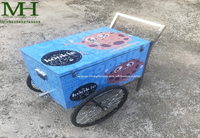
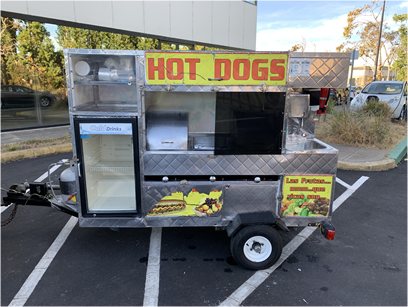
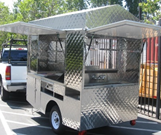
A summary of CMFO (cart) structural requirements that may be required are found here. Prepackaged Food and Non-Prepackaged Food
A CMFO (cart) may be eligible for a Legal Exemption CMFO from possessing an ACDEH permit to operate.
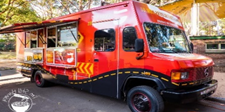
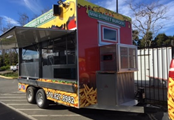
Requirements for plan submittal can be found here.
Click here for more information.
Fee Exemption
Fee Exemption Form for qualified Veterans of Sole Proprietorship Businesses
MFF/CMFO FACILITIES ARE NOT TEMPORARY FOOD FACILITIES (TFF) AND SHALL NOT APPLY AS A TFF. A TFF PERMIT WILL NOT BE ISSUED TO AN MFF/CMFO OPERATOR.

